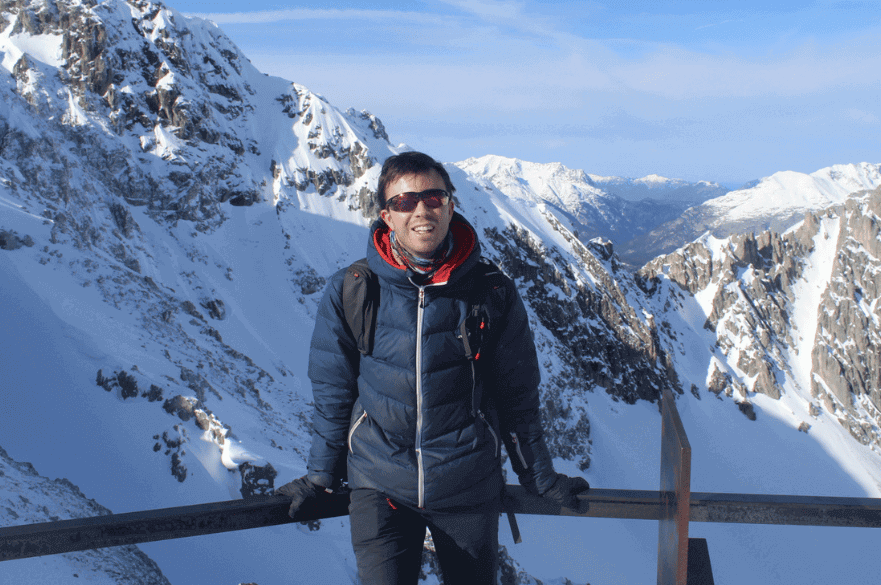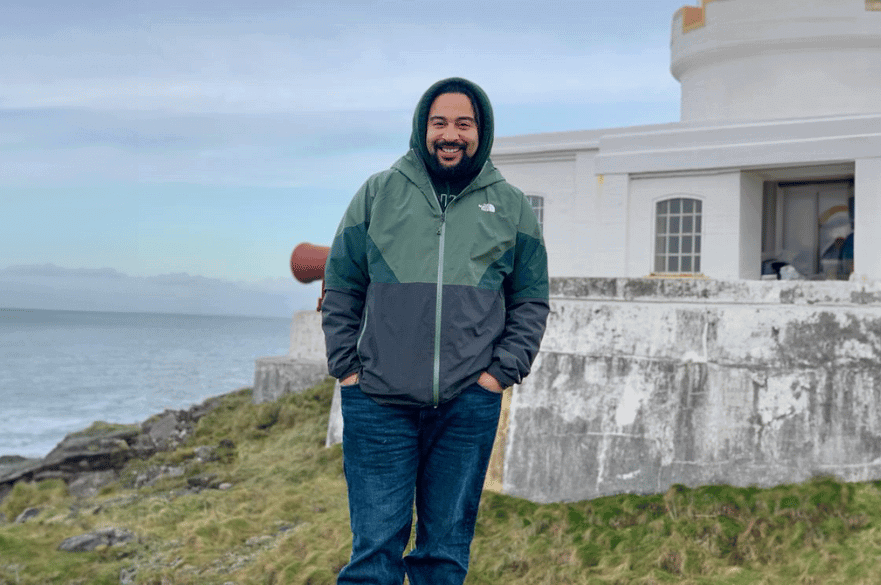
The learnings and knowledge gained from studying Ecology and Conservation at NTU have been extensive and successfully prepared me for a career in the ecology sector.
More about James
Why did you choose to study at NTU?
NTU’s Brackenhurst Campus is a truly special and unique place to study. Upon visiting the campus for my first open day before starting the course, I was in awe of its idyllic rural setting, the friendly and close-knit community atmosphere, and the specialist facilities geared towards students wishing to pursue environmental and animal-focused courses. Having studied my A-levels at a small sixth form located in a rural Derbyshire town, Brackenhurst felt like a very homely and comfortable place to be, rather than transitioning to living and studying in a big city. Because of these reasons, I knew that NTU had to be at the top of my list for places to study an environment and conservation-related course. Looking back, I have many fond memories of my time at NTU, in particular being immersed in the surrounding greenspace and 200 hectares of woodland and farmland at Brackenhurst campus, whether for studying or for recreation! With that, it really is a university with a difference… having access to the greenspace and open-air classroom, alongside the perks of the city campus facilities and Nottingham city centre being just a bus ride away!
For this type of course, NTU is the best place to study, as Brackenhurst cannot be matched for its 200 hectares of land instantly available for students to freely use in developing the range of vocational skills acquired as part of the course and having valuable green space to access on the doorstep.
The small group sizes allowed for lots of interaction, group discussions and friendly support from module tutors throughout in teaching sessions, lab practical sessions and fieldtrips, gaining in-depth subject knowledge. Tutors are very supportive and provide extensive feedback for assessment opportunities to help students constructively improve their work and also commend what they have done well.
What did you learn - both inside and outside of lectures?
The learnings and knowledge gained from studying Ecology and Conservation at NTU have been extensive and successfully prepared me for a career in the ecology sector. Teaching sessions covered a range of topics, with theoretical aspects often underpinned by practical application in the field, which helped to put different ecological and conservation-related concepts into context.
Inside teaching sessions, we had the opportunity to undertake ecological surveys for a range of purposes. These included protected species surveys, such as for great crested newts and breeding birds, and habitats such as hedgerows, woodland, and grassland, which helped to improve my botanical knowledge and plant species identification skills, alongside setting me up for a role related to ecological consultancy. We developed a range of technical skills, including the use of Geographical Information Systems (GIS) for spatial monitoring of ecosystems and wildlife populations, and data analysis using specialist programs such as Minitab. We covered a range of key ecologically relevant issues, such as planning and environmental policy and legislation which underpins how human developments can proceed in relation to protecting and enhancing biodiversity. Topics related to larger-scale ecosystem management and environmental issues were covered through a range of lectures with different speakers, such as climate change, deforestation, protected area management, balancing recreation needs with conservation management, peatland degradation and restoration, pollution, and catchment management. In fact, it was the focus on the larger-scale as well as smaller-scale aspects of ecology and conservation management, from wildlife populations through to land use and ecosystems, that attracted me to this course. We also had the opportunity to undertake practical habitat management activities, such as vegetation clearance at Brackenhurst’s dew pond, hedge-laying on the Brackenhurst estate, and lowland heathland management at the nearby Sherwood Pines estate, which, looking back at my time on the course, were all memorable days.
Outside of teaching sessions, I learned about the importance of networking with others in the field, getting involved with local conservation projects to enhance industry experience, taking part in society-related events at the university, and the importance of helping and collaborating with others to achieve a common goal. On that note, conservation happens by bringing many different types of people together to share knowledge, understand priorities, and ultimately deliver successful outcomes for nature. Studying ecology and conservation at NTU has opened my eyes to the intricacies and interconnectedness of the natural world, in particular the fact that we are part of, not separate from, nature, and rely on the ecosystem services provided by nature for thriving societies, from regulating air quality and sequestering carbon, providing food and raw materials, to the many cultural and spiritual relations that the natural world brings. Further, I learned much about the various conservation projects taking place in Nottinghamshire and beyond, thanks to attending fieldtrips and conservation work parties organised by the Conservation Society. In particular, undertaking scrub clearance work for the grizzled skipper butterfly with the Nottinghamshire Biodiversity Action Group opened the doors to me finding out about the ‘Biodiversity Opportunity Mapping’ project taking place with landowners across the county, and the great conservation work that is going on locally. Again, it is all about trying different things out and regularly networking with others!
My standout take home message would be the importance of remaining resilient and not losing track of your ambitions, whatever you’re studying for your degree. There were points during the course where I encountered setbacks, for example struggling with an assignment, dealing with cancelled overseas fieldtrips due to Covid-19, or adapting to changing circumstances due to Covid during my sandwich placement year, where my RSPB internship was cancelled and I therefore needed to look for opportunities elsewhere. Help and support is there, and I was never far away from a call or email with a course lecturer, Employability staff member, or support staff to help get me through the more challenging moments. Honestly, all these experiences make us stronger in the long run.
What have you been up to since graduating?
Since graduating from NTU, my career path has entailed a tapestry of experiences and activities. Thanks to the opportunity to undertake seasonal survey and administrative work with an ecological consultancy to gain workplace experience during my sandwich placement year, I am now employed with the same company as of November 2023. I especially enjoy the varied nature of the work, whether that is being in the field conducting protected species surveys, such as for bats, great crested newt, badgers, or reptiles, or habitat surveys and ecological appraisals, such as Phase 1 Habitat surveys, UK Habitat Classification surveys, or Biodiversity Net Gain site assessments. Likewise, I also enjoy the desk-based elements of the work, such as writing reports and reviewing survey data, for example writing bat roost assessments and presence/absence survey reports, Preliminary Ecological Appraisal reports, analysing sonograms recorded during bat surveys, and producing maps to present spatial data using QGIS software. I am particularly interested in the Biodiversity Net Gain policy and the habitat surveying and management side of the work. With this, I am keen to improve my botanical knowledge and plant identification skills to become more competent in conducting ecological appraisals, from a combination of training courses and gaining knowledge from senior ecologists during field surveys.
From September 2022 to September 2023, I completed a Masters in Research (MRes) course at the University of Sheffield in Ecology and Environment. I was attracted to this course because of its research-centred focus and the opportunity to be embedded in a research group working on a specific subject of interest within the environmental/ conservation field. I combined my interest in peatlands, having grown up at the foot of the Kinder Scout peatland plateau in the Peak District, and passion for conservation communications, having a background in media communication and marketing from my Media Studies and English Language A-levels, to work on a project that tested the effectiveness of different adverts promoting peatland restoration to the general public. By designing conservation adverts (posters) and a questionnaire, we tested whether the framing of different messages focused on specific benefits of peatland restoration, including providing ecosystem services (human benefits) or improving habitat for wildlife (nature benefits), along with the characteristics of respondents related to their nature connection, peatland visitation, and knowledge of peatlands, influenced support for their restoration. Alongside the research project, the course involved a range of useful skills-focused modules, such as methods for science communication and statistical analysis using R programming software. Ultimately, the course provided an ideal progression from the skills and experience gained during the ecology and conservation course at NTU.
Outside of my main work, I enjoy volunteering with conservation organisations in my local area. Unsurprisingly, I like to get involved with a lot of peatland monitoring and restoration work! This includes days out conducting water table surveys in the winter and vegetation surveys in the summer with the Moors for the Future Partnership, alongside attending science engagement events with the partnership’s ‘Bogtastic’ van. Elsewhere, I assist with a range of peatland monitoring surveys and practical reserve management activities at the Dovestone Estate in the Peak District, managed by the RSPB.
What does your current day involve?
Typically, four days a week I am working with the ecological consultancy. Every day is different for this, whether that is out in the field surveying a small land parcel or a building, surveying a larger site such as an area of grassland earmarked for housing development, a quarry that is planned for extension, or a more complex area of land consisting of a range of habitats. Equally, I could be at the desk reviewing protected species and habitat data for a specific site, writing up a report for a recent site in which I led or assisted with the survey, or producing maps and aerial plans for surveyed sites or in preparation for an upcoming site visit. One day in the week I typically head out for one of my volunteering activities in the Peaks, or if not, I try and dedicate time to catching up on current developments, including reading news articles and scientific journal articles, in the ecology, conservation, and environment fields. Elsewhere, I enjoy trail and fell running, competing in a range of events in hilly places such as the Peak District, Lake District, and Yorkshire Dales, and, when running generally, I always find this provides me with much-needed contemplation and solitude.
What attracted you to this field?
From a young age, I have always had an interest and deep connection with nature. I enjoy being outside, immersed in open space, and taking in what is around me, such as the passing birds, mature trees, or the general surrounding landscape. I feel a sense of gratitude and meaningfulness from helping to protect and value nature, whether that is a block of woodland, species-rich grassland, a nesting bird, a roosting bat, or a single newt, for example. More widely, it is a good time to be involved in the ecology and conservation sector; the drive and expertise of ecologists is paramount to ensure key environmental policy targets are met and we shift towards a more sustainable society that works in harmony with nature. This includes the need to monitor the condition of protected sites, ensure Biodiversity Net Gain requirements for developments are implemented and monitored, deliver and assist with species reintroductions, and implement ecological restoration and ecosystem recovery measures. Finally, it is no underestimate to say that my passion and interest in ecology and conservation has formed a big part of who I am today.
What has been the highlights and biggest challenges of your career so far?
Key highlights of my career involve the many memorable site visits and fieldwork experiences as part of my ecological consultancy and conservation volunteering work. At the consultancy, every day is different, and the opportunity to travel and visit different habitats and sites provides a real sense of excitement to the work that I do, such as conducting bat surveys on remote rural field barns, ecological appraisals on quarry sites, plant surveys on salt marsh and species-rich grassland (and seeing a bearded tit at one point!), and the opportunity to handle a brown-long eared bat as part of a bat monitoring survey in a woodland site, to name just a few. It is a pleasure to work alongside like-minded and experienced senior ecologists and fellow graduate ecologists in the company. It is a really supportive network, with people on hand to provide advice or assistance which has helped to enhance my professional development, whether at the desk compiling reports or out onsite conducting surveys. I have had many memorable volunteering days in the hills, whether that is in the mist and rain trudging through deep peat to undertake water table measurements, or undertaking vegetation surveys on a warm summer’s day. It has been interesting to see key policy developments over recent years, such as the Nature Recovery Network and Biodiversity Net Gain in England, which have paved the direction of travel for my current work as an ecologist.
I have encountered challenges along the way, however with the help from others and the appropriate preparation, I have got through them to the other side. Adapting to working in the evenings and early mornings during the ecology survey season in the spring and summer, often with lots of driving in between, takes some time to adjust to. Further, ensuring that all survey information and logistics are covered and planned well in advance are very important but sometimes an overlooked aspect of ecology work. This includes retrieving site development plans, organising transport, arranging and checking specific equipment, informing relevant site contact(s) about an upcoming survey, and liaising with clients about further requirements following an ecological survey. Elsewhere, I have needed to overcome obstacles in order to progress and develop my technical skills. This includes improving scientific writing skills for the master’s project write-up and other reports, coding using R software to process and analyse data for the master’s course, and ensuring that I have clear set aims and objectives before embarking on a research project. As the saying goes, you cannot cover everything!
If you had a time machine, what would you go back and tell yourself at NTU?
I would tell myself to be open-minded. Don’t feel like you need to have everything mapped out in front of you when you first start, or even when you finish your course. Your career path will likely take many different exciting twists and turns, so be willing to explore different options and put yourself (i.e. your ambitions, your interests, etc) in the middle, rather than feeling dictated by the course you are studying and an arbitrary expectation of what you should go into after your course. To put it simply, ensure that you follow your own passions and interests, and the rest will fall into place. Also, be inquisitive, enquire and ask questions, enjoy reading about your subject, and embrace opportunities to network with people in industry.
Finally, is there anything else you'd like to share with our student and alumni community?
I wish you all the very best in your future career. If you made it this far, thank you very much for reading this profile!
Still need help?
-

STUDENT PROFILE
Ajay Tegala
Ecology and ConservationUnited Kingdom
https://www.ntu.ac.uk/study-and-courses/courses/our-students-stories/animal-rural-environmental-sciences/ajay-tegala
-

STUDENT PROFILE
Ajay Uniyal
Food Science and TechnologyIndia
https://www.ntu.ac.uk/study-and-courses/courses/our-students-stories/animal-rural-environmental-sciences/ajay-uniyal
-

STUDENT PROFILE
Bejohn Quigley
Ecology and ConservationUnited Kingdom
https://www.ntu.ac.uk/study-and-courses/courses/our-students-stories/animal-rural-environmental-sciences/bejohn-quigley